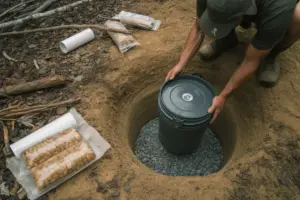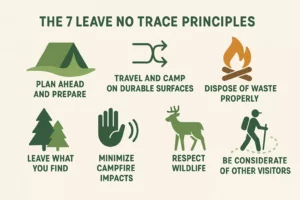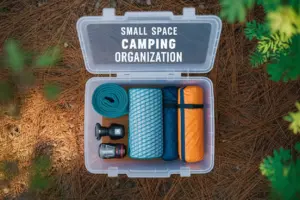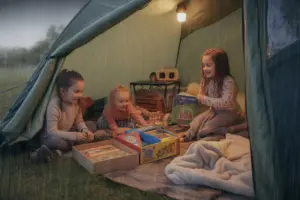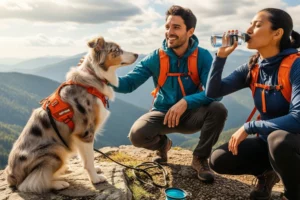5 Smart Ways to Keep Mosquitoes Away While Camping 🏕️
Picture this: You’ve set up the perfect campsite, the fire is crackling, and the stars are beginning to emerge. Then you hear it—the unmistakable high-pitched whine of a mosquito buzzing near your ear. What started as a peaceful evening quickly turns into a battle against these persistent insects. Don’t let mosquitoes ruin your outdoor adventure. With the right strategies and preparation, you can enjoy your camping trip without constantly swatting away these unwelcome guests.
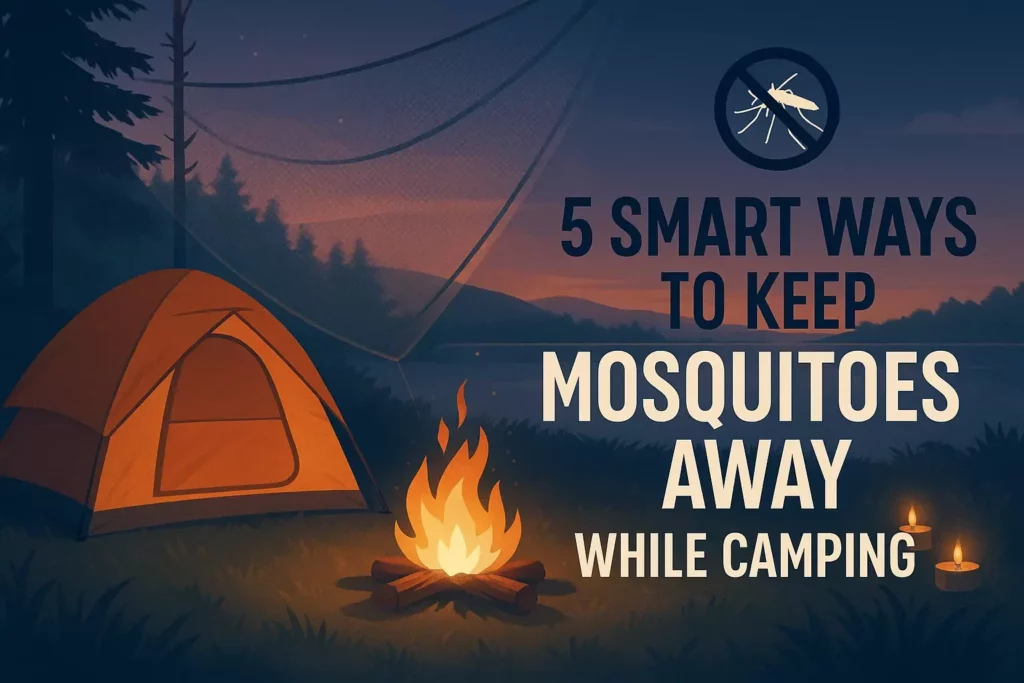
Key Takeaways
- Choose your campsite wisely – Avoid areas near stagnant water and opt for breezy, elevated locations
- Use proven repellents – DEET, picaridin, and natural oils provide effective protection against mosquitoes
- Create physical barriers – Proper clothing, treated gear, and campsite setup significantly reduce exposure
- Time your activities – Mosquitoes are most active during dawn and dusk hours
- Maintain a clean campsite – Remove standing water and food sources that attract insects
Understanding the Mosquito Problem While Camping
Mosquitoes aren’t just annoying—they can pose serious health risks by transmitting diseases like West Nile virus, Zika, and malaria in certain regions. These insects thrive in outdoor environments, making camping particularly challenging. Female mosquitoes are attracted to carbon dioxide, body heat, and certain scents, which means simply being outdoors makes you a target.
The key to successful mosquito control while camping lies in understanding their behavior and implementing multiple defense strategies. No single method provides 100% protection, but combining several approaches creates an effective barrier against these persistent bugs and insects.
1. Strategic Campsite Selection and Setup 🎯
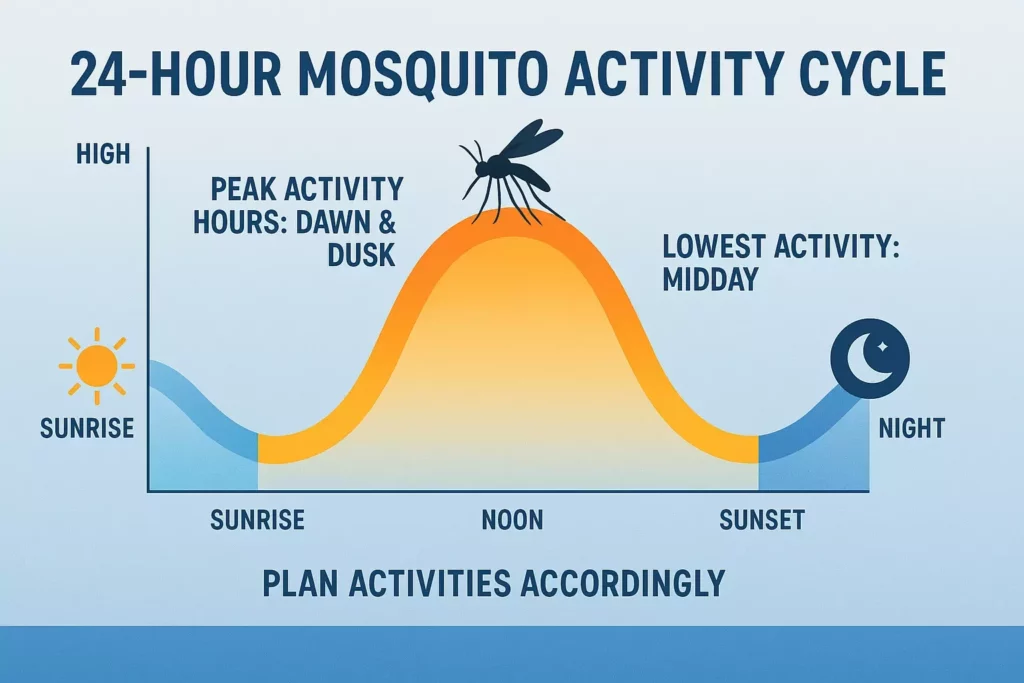
Choose Your Location Wisely
The first line of defense against mosquitoes begins before you even unpack your gear. When learning how to keep mosquitoes away while camping, location selection proves crucial. Mosquitoes breed in standing water, so avoid camping near:
- Ponds, lakes, or slow-moving streams
- Marshy or swampy areas
- Areas with poor drainage after rain
- Dense vegetation that traps moisture
Instead, look for these ideal camping spots:
- Elevated areas with good air circulation
- Open spaces where breezes can blow mosquitoes away
- Well-drained ground that doesn’t collect water
- Areas with natural predators like bats or dragonflies
Optimize Your Campsite Layout
Once you’ve chosen your location, strategic setup can make a significant difference:
| Setup Element | Mosquito-Fighting Benefit |
|---|---|
| Tent placement | Position away from water sources and in breezy areas |
| Cooking area | Keep downwind from sleeping area to avoid attracting insects |
| Water storage | Cover all containers to prevent breeding sites |
| Gear organization | Eliminate items that collect rainwater |
When setting up your campsite, ensure your tent is properly sealed and consider using a groundsheet to create an additional barrier. Remove any containers or gear that might collect rainwater, as even small amounts can become mosquito breeding grounds.
Pro Tip: Set up camp before dusk when possible. Mosquitoes become most active during twilight hours, and you’ll want your defenses in place before they emerge in full force.
2. Effective Repellent Strategies 🛡️
Chemical Repellents That Work
When it comes to proven mosquito protection, certain chemical repellents stand out for their effectiveness:
DEET (N,N-Diethyl-meta-toluamide)
- Concentration: 20-30% provides 4-6 hours of protection
- Application: Apply to exposed skin and clothing
- Effectiveness: Gold standard for mosquito repellent
Picaridin
- Benefits: Less greasy than DEET, odorless, doesn’t damage synthetic materials
- Duration: 8-12 hours of protection
- Skin-friendly: Less likely to cause irritation
Permethrin for Gear Treatment
- Use: Treat clothing, tents, and sleeping bags
- Longevity: Remains effective through multiple washes
- Safety: Safe when dry, highly effective against mosquitoes
Natural Repellent Alternatives
For those preferring natural options, several essential oils show promise:
- Lemon eucalyptus oil – EPA-registered, 6-hour protection
- Citronella – Moderate effectiveness, pleasant scent
- Peppermint oil – Natural deterrent, cooling effect
- Lavender – Mild repellent properties, calming aroma
Application Best Practices:
- Reapply regularly according to product instructions
- Cover all exposed skin including ankles and wrists
- Don’t forget often-missed areas like behind ears and between fingers
- Layer protection by treating both skin and clothing
When packing your camping gear, include multiple types of repellents to ensure you’re prepared for varying conditions and personal preferences.
3. Physical Barriers and Protective Clothing 👕
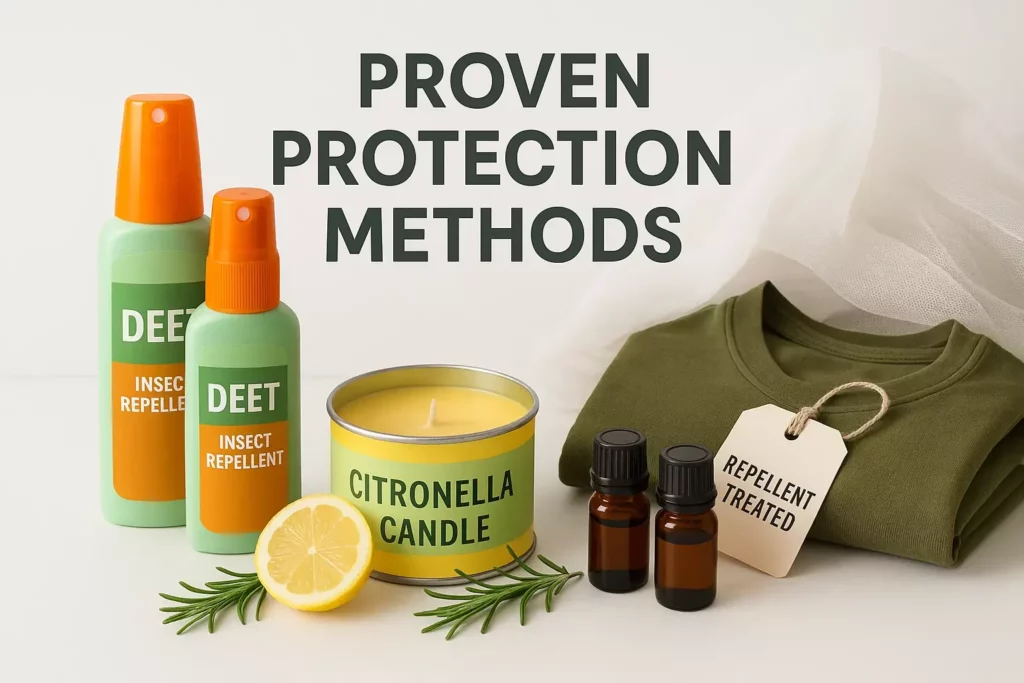
Smart Clothing Choices
Your clothing serves as the first physical barrier against mosquitoes. Understanding how to keep mosquitoes away while camping includes making smart wardrobe decisions:
Fabric and Color Selection:
- Light colors are less attractive to mosquitoes
- Tightly woven fabrics prevent bites through clothing
- Synthetic materials can be treated with permethrin
- Avoid dark colors which attract mosquitoes
Essential Protective Clothing:
| Clothing Item | Protection Level | Key Features |
|---|---|---|
| Long-sleeved shirts | High | Covers arms completely, choose breathable fabrics |
| Long pants | High | Tuck into socks for complete coverage |
| Socks and closed shoes | Medium | Protect feet and ankles |
| Hat with brim | Medium | Protects head and neck area |
| Bandana or neck gaiter | Low-Medium | Additional neck protection |
Gear-Based Physical Barriers
Beyond clothing, several gear options create effective barriers:
Mosquito Netting:
- Head nets for face and neck protection
- Pop-up screen shelters for dining and relaxation
- Tent with fine mesh to prevent entry while maintaining airflow
Treated Gear Benefits:
- Pre-treated clothing lasts through multiple washes
- Treated sleeping bags provide overnight protection
- Permethrin-treated gear doesn’t require reapplication
When choosing appropriate camping attire, prioritize coverage over style. The temporary inconvenience of extra clothing far outweighs the discomfort of mosquito bites.
🦟 Mosquito Activity Tracker for Camping
🛡️ Protection Recommendations
4. Natural Deterrents and Campfire Strategies 🔥
Campfire as a Mosquito Deterrent
A well-managed campfire serves multiple purposes beyond warmth and cooking. The smoke naturally repels mosquitoes, and certain materials can enhance this effect. When learning how to keep mosquitoes away while camping, understanding fire management becomes essential.
Smoke-Producing Materials:
- Sage – Natural mosquito repellent when burned
- Rosemary – Pleasant aroma, effective deterrent
- Cedar – Long-burning, naturally repels insects
- Pine needles – Readily available, moderate effectiveness
Campfire Best Practices:
- Position strategically – Place fire downwind from seating areas
- Maintain steady smoke – Avoid overly hot, smokeless fires
- Use dry, aromatic woods – Cedar, pine, and hardwoods work best
- Keep fire burning during peak mosquito hours (dusk and dawn)
Safety Note: Always follow local fire regulations and maintain proper fire safety practices. Never leave a campfire unattended.
Natural Plant-Based Deterrents
Several plants and natural materials can help create a mosquito-free zone around your campsite:
Essential Oil Diffusion:
- Citronella torches – Traditional and effective
- Lavender sachets – Place around sleeping area
- Peppermint oil on fabric – Hang treated cloths around camp
- Lemon eucalyptus – Apply to tent guy-lines
Companion Planting Strategy:
If car camping where you can bring plants:
- Marigolds – Natural pest deterrent
- Basil – Culinary use plus mosquito repelling
- Catnip – More effective than DEET in some studies
When preparing your camping meals, consider incorporating naturally repellent herbs like garlic and onions into your cooking. The aromatic compounds can provide additional protection.
5. Timing and Activity Planning ⏰
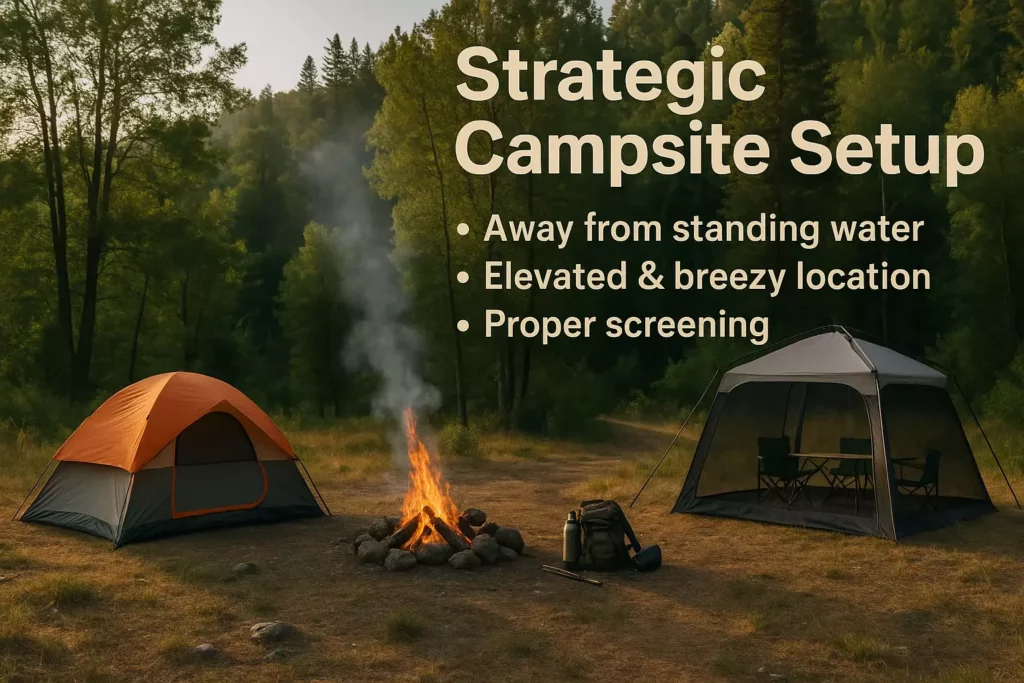
Understanding Mosquito Behavior Patterns
Mosquitoes aren’t equally active throughout the day. Understanding their behavior patterns allows you to plan activities strategically and minimize exposure during peak times.
Peak Activity Periods:
- Dawn (5-7 AM) – High activity as mosquitoes seek morning meals
- Dusk (6-8 PM) – Highest activity period of the day
- Night (8 PM-5 AM) – Continued activity, especially near lights
- Midday (10 AM-4 PM) – Lowest activity due to heat and UV exposure
Strategic Activity Planning:
| Time Period | Mosquito Activity | Recommended Activities |
|---|---|---|
| Early Morning (5-9 AM) | High | Stay near campfire, wear repellent |
| Mid-Morning (9 AM-12 PM) | Low | Hiking, exploration, setup tasks |
| Afternoon (12-5 PM) | Very Low | Swimming, open-area activities |
| Evening (5-7 PM) | Increasing | Prepare dinner, apply repellent |
| Dusk (7-9 PM) | Very High | Stay in screened areas, use barriers |
| Night (9 PM+) | High | Tent time, avoid bright lights outside |
Weather-Based Adjustments
Weather conditions significantly impact mosquito activity:
High Activity Conditions:
- Calm, humid evenings – Perfect mosquito weather
- After rain – Increased breeding sites
- Warm temperatures (70-85°F) – Optimal for mosquito activity
- Low wind conditions – Mosquitoes can’t fly well in wind
Low Activity Conditions:
- Windy days – Natural deterrent
- Very hot days (85°F+) – Mosquitoes seek shade
- Cold temperatures (below 60°F) – Reduced activity
- Dry conditions – Fewer breeding opportunities
When camping with kids, timing becomes even more critical. Plan family activities during low-activity periods to ensure everyone stays comfortable and protected.
Additional Protection Strategies
Water Management
Proper water management prevents mosquito breeding while ensuring you have clean drinking water:
- Cover all water containers with tight-fitting lids
- Empty and refill water bowls for pets daily
- Use proper water purification methods – Learn about water purification techniques
- Drain any collected rainwater from tarps or containers
Sleeping Protection
Nighttime protection requires special attention since mosquitoes remain active:
- Choose the right sleeping bag – Proper sleeping bag selection includes considering bug protection
- Use treated bed nets if sleeping under the stars
- Seal tent entrances immediately after entry
- Position tent in breezy areas when possible
First Aid Preparedness
Despite best efforts, some bites are inevitable. Include these items in your camping first aid kit:
- Anti-itch cream or calamine lotion
- Antihistamines for allergic reactions
- Cold compresses for swelling
- Antiseptic wipes to prevent infection from scratching
Emergency Situations and Severe Infestations
When to Relocate
Sometimes mosquito populations are so severe that relocation becomes necessary:
- Swarms that persist despite multiple deterrents
- Recent flooding creating massive breeding areas
- Family members with severe allergic reactions
- Inability to enjoy basic camping activities
Backup Protection Methods
Always have backup protection methods in your survival kit:
- Extra repellent in different formulations
- Backup clothing for full coverage
- Emergency shelter with fine mesh screening
- Battery-powered fans for personal air circulation
Conclusion
Learning how to keep mosquitoes away while camping requires a multi-layered approach combining smart planning, effective products, and strategic timing. The five methods outlined—strategic campsite selection, proven repellents, physical barriers, natural deterrents, and activity timing—work best when used together rather than individually.
Remember that perfect mosquito protection doesn’t exist, but these strategies can reduce encounters by 80-90% when properly implemented. Start planning your defense before you leave home, pack redundant protection methods, and remain flexible enough to adjust your approach based on conditions.
Your Next Steps:
- Research your destination for local mosquito activity patterns and any disease concerns
- Pack a comprehensive bug protection kit with multiple repellent types
- Plan your campsite setup to minimize mosquito-friendly conditions
- Schedule activities around peak mosquito activity times
- Prepare backup plans in case initial strategies prove insufficient
Don’t let mosquitoes and other bugs insects prevent you from enjoying the great outdoors. With proper preparation and the right strategies, you can focus on what really matters—creating memorable camping experiences in nature’s beautiful settings.

